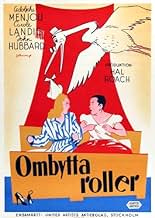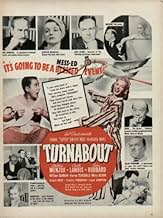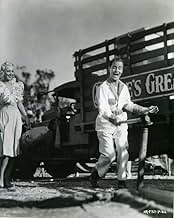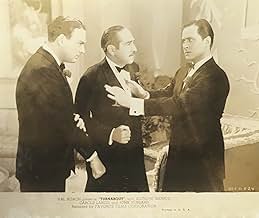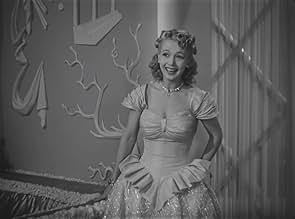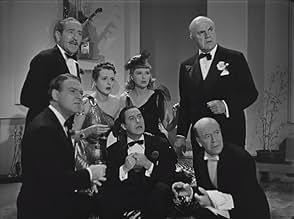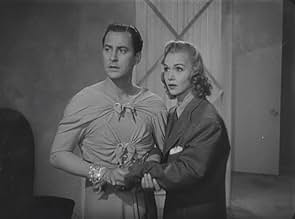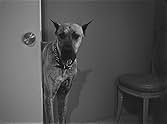CALIFICACIÓN DE IMDb
6.1/10
824
TU CALIFICACIÓN
Agrega una trama en tu idiomaBickering husband and wife Tim and Sally Willows mutter a few angry words to a statue of Buddha and wind up living each other's life.Bickering husband and wife Tim and Sally Willows mutter a few angry words to a statue of Buddha and wind up living each other's life.Bickering husband and wife Tim and Sally Willows mutter a few angry words to a statue of Buddha and wind up living each other's life.
- Dirección
- Guionistas
- Elenco
Opiniones destacadas
A mystical bust of a turbaned god gives a bickering, unsatisfied married couple exactly what they want: they switch bodies...but unfortunately not voices, which means the husband--who is one-third of a partnership in a big city advertising firm--talks like a girl and prances around his office complete with pocketbook! Very early entry in the body-switching genre is much fresher than some of the similar comedies which followed years later; the film doesn't have an esteemed reputation, so it's difficult to imagine that it influenced other pictures, but surely this was the starting point (or close to it). There are some very fast, very funny lines, quick and efficient gags, bright performers--however the first thirty minutes (a straight satire on big business before the 'magical' troubles begin) is just fine all by itself. The body-switching ploy pretty much comes out of nowhere and sticks out as a gimmick, when actually the movie was progressing very well without it. **1/2 from ****
Although Adolphe Menjou is billed first, the "Turnabout" stars are John Hubbard (as Tim, then Sally) and Carole Landis (as Sally, then Tim); they play a bickering couple who are granted a wish: they switch bodies! There are some stereotypes evident, but this is a surprisingly well-done comedy from the time period. Possibly, the most "offensive" bit is not the gender role playing, but the repeated bit involving Mr. Menjou and the water fountain. Donald Meek (as Henry) and Marjorie Main (as Nora) are delightful as servants to the gender-bending couple. Mr. Hubbard and Ms. Landis are funny and believable. The ending is a trifle weak; but, "Turnabout" is an enjoyable surprise.
****** Turnabout (1940) Hal Roach ~ John Hubbard, Carole Landis, Adolphe Menjou
****** Turnabout (1940) Hal Roach ~ John Hubbard, Carole Landis, Adolphe Menjou
Watching Turnabout and knowing it was produced and directed by Hal Roach right after One Million BC which made stars of Victor Mature and Carole Landis, I'm wondering if Roach didn't want to do this film with both of stars from One Million BC. For whatever reason Mature didn't do this one, Roach co-starred Landis with John Hubbard who was also in the cast of One Million BC.
Known primarily for his short subjects, Roach occasionally did a feature film that bent a few rules of the Code. Possibly because he was not in with the major film studios, Roach had a whole lot more creative freedom and is Turnabout he made the most of it.
Landis and Hubbard are a young and constantly bickering couple. He's a partner in an advertising agency with William Gargan and Adolph Menjou. And her two best friends are Mary Astor and Joyce Compton, said wives of Menjou and Gargan.
After a day of quarreling both express a wish to live each other's lives and they express it before a statue of a Hindu deity named Ram which grants their wish. Whoosh, and they're in each other's attire and talking for the audience's amusement with each other's voices.
After that it's a succession of gender bending jokes and lines which come so fast it's a crying shame that Turnabout is not out on DVD or VHS. With those you have the luxury of rewinding and hearing it again to catch what you missed. And this is the kind of film where you can watch it over and over and still come up with a fresh laugh.
For a small studio Roach's reputation was such that he commanded a supporting cast that could and did equal a film from any of the major studios. Besides the names already mentioned Turnabout includes Marjorie Main, Verree Teasdale, Franklin Pangborn, Berton Churchill and Donald Meek.
The last includes the funniest sight gag in the film. Meek plays Hubbard's manservant and he's quite a sight trying to deal with a ferocious little dog that looks more like a bear cub. Absolutely hilarious and there's quite the story of how that dog came into the possession of Hubbard and Landis.
This film must have been in the inspiration for those Walt Disney Freaky Friday films and the Dudley Moore/Kirk Cameron film Like Father Like Son. But none of those could boast a cast like this.
This one is an absolute gem, just waiting to be rediscovered.
Known primarily for his short subjects, Roach occasionally did a feature film that bent a few rules of the Code. Possibly because he was not in with the major film studios, Roach had a whole lot more creative freedom and is Turnabout he made the most of it.
Landis and Hubbard are a young and constantly bickering couple. He's a partner in an advertising agency with William Gargan and Adolph Menjou. And her two best friends are Mary Astor and Joyce Compton, said wives of Menjou and Gargan.
After a day of quarreling both express a wish to live each other's lives and they express it before a statue of a Hindu deity named Ram which grants their wish. Whoosh, and they're in each other's attire and talking for the audience's amusement with each other's voices.
After that it's a succession of gender bending jokes and lines which come so fast it's a crying shame that Turnabout is not out on DVD or VHS. With those you have the luxury of rewinding and hearing it again to catch what you missed. And this is the kind of film where you can watch it over and over and still come up with a fresh laugh.
For a small studio Roach's reputation was such that he commanded a supporting cast that could and did equal a film from any of the major studios. Besides the names already mentioned Turnabout includes Marjorie Main, Verree Teasdale, Franklin Pangborn, Berton Churchill and Donald Meek.
The last includes the funniest sight gag in the film. Meek plays Hubbard's manservant and he's quite a sight trying to deal with a ferocious little dog that looks more like a bear cub. Absolutely hilarious and there's quite the story of how that dog came into the possession of Hubbard and Landis.
This film must have been in the inspiration for those Walt Disney Freaky Friday films and the Dudley Moore/Kirk Cameron film Like Father Like Son. But none of those could boast a cast like this.
This one is an absolute gem, just waiting to be rediscovered.
This Hal Roach production from 1940 is a great comedy with outstanding actors and plenty of laughs. There is a sex change and body swapping between a husband and wife, the wife role is played by Carole Landis,(Sally Willows), "I Wake Up Screaming" and the husband is performed by John Hubbard, (Tim Willows). These two married couples have a statue of a Buddha which has magical powers and seems to be getting tired of this couple arguing about each other, so he offers this couple a chance to change their sex in order for the wife to perform her husbands duties at the office and the husband will perform the duties of the wife at home. In this household there is a great Dane dog and a bear cub running all around their dwellings. Sally Willows even climbs a flag pole in order to put up an Aeriel. William Gargan, (Joel Clare) and Mary Astor gave great supporting roles. Carole Landis gave a great performance through out the entire picture and was very young and beautiful in this film.
Although not a great film this is never the less, in its own way, unforgettable. The first section of the film plays as a light comedy and is amusing enough. As soon as the gender reversal fun begins, however, it moves into a different league - one which startles by the casual way it plays with sexual expectations and stereotyping.
The Willows' transformation (through the creaky genie device) is potentially explosive stuff and, to his credit, Roach successfully steers an innocent course between pantomime and farce. Although the sexual naivety of the film is obvious, to modern eyes the homosexual/lesbian resonance of the scenario is still very funny and, for its time, I think rather daring. Hubbard's fey alter ego especially is a joy to behold, and I am surprised that this film is not better known to lovers of gay camp.
Some elements of the supporting plot reinforces the echoes of sex and gender play too: the mix up with the pets for instance, prefiguring later confusions over role, or Willows' over-aggressive personal trainer, whose grappling is suggestive of an unwanted sexual encounter. Even the running joke of hiding drink from the wife suggests a furtive vice, again particularly apposite in context.
Menjou and Landis lend a touch of class to the proceedings, and although studio-bound, and not particularly realistic in scale, the set design is elegant and spacious. The otherwise (to me) unknown John Hubbard reminds me of Ed Wood in Glen or Glenda - it's that sort of film, where men slip on Angora sweaters and then light a pipe.
This is a project that is more successful exactly because it is directed by comedy veteran Roach. It would have perhaps emerged as a far safer, and therefore far less enjoyable vehicle in the hands of a larger studio or, if made by a director with a different background.
The Willows' transformation (through the creaky genie device) is potentially explosive stuff and, to his credit, Roach successfully steers an innocent course between pantomime and farce. Although the sexual naivety of the film is obvious, to modern eyes the homosexual/lesbian resonance of the scenario is still very funny and, for its time, I think rather daring. Hubbard's fey alter ego especially is a joy to behold, and I am surprised that this film is not better known to lovers of gay camp.
Some elements of the supporting plot reinforces the echoes of sex and gender play too: the mix up with the pets for instance, prefiguring later confusions over role, or Willows' over-aggressive personal trainer, whose grappling is suggestive of an unwanted sexual encounter. Even the running joke of hiding drink from the wife suggests a furtive vice, again particularly apposite in context.
Menjou and Landis lend a touch of class to the proceedings, and although studio-bound, and not particularly realistic in scale, the set design is elegant and spacious. The otherwise (to me) unknown John Hubbard reminds me of Ed Wood in Glen or Glenda - it's that sort of film, where men slip on Angora sweaters and then light a pipe.
This is a project that is more successful exactly because it is directed by comedy veteran Roach. It would have perhaps emerged as a far safer, and therefore far less enjoyable vehicle in the hands of a larger studio or, if made by a director with a different background.
¿Sabías que…?
- TriviaPolly Ann Young, who plays Miss Twill, is the older sister of film star Loretta Young.
- ErroresWhen the woman's personality is in the man's body and the actor in the part shows this with female reactions and gestures, he looks at his fingernails by holding his hand palm up and bending the fingers toward himself. This is the way a man, not a woman, regards their fingernails, and it often appears in fiction as one way by which a man dressed as a woman is caught out. Women study their fingernails by holding a hand palm down and extending the fingers so that they are flat with the rest of the hand.
- Citas
Sally Willows: Now listen to me, Tim Willows, the situation with this dog of yours has gone entirely too far. He goes to a kennel tomorrow or I go!
Tim Willows: Darling, you wouldn't have much fun in a kennel.
- ConexionesFollowed by Turnabout (1979)
- Bandas sonorasMargie
(1920) (uncredited)
Music by Con Conrad and J. Russel Robinson
Lyrics by Benny Davis
Sung by a chorus on radio with modified lyrics
Selecciones populares
Inicia sesión para calificar y agrega a la lista de videos para obtener recomendaciones personalizadas
- How long is Turnabout?Con tecnología de Alexa
Detalles
- Fecha de lanzamiento
- País de origen
- Sitio oficial
- Idioma
- También se conoce como
- Turnabout
- Locaciones de filmación
- Productora
- Ver más créditos de la compañía en IMDbPro
- Tiempo de ejecución
- 1h 23min(83 min)
- Color
- Relación de aspecto
- 1.33 : 1
Contribuir a esta página
Sugiere una edición o agrega el contenido que falta

